HVAC Companies Hesketh Bank
Find top Air Conditioning Services in Hesketh Bank
Get 3 FREE HVAC Services quotes for your project today! Compare profiles, reviews, accreditations, portfolio, etc... and choose the best offer.

John Cayley Plumbing and Heating Engineer
554 reviews53 Barrowford Road, Colne, BB8 9QP, GBAs a Gas Safe registered engineer with over 30 years' experience, I'm able to quickly diagnose and resolve all manner of gas boiler faults, including leaks, shutdowns and intermittent hot water. I'm a fully qualified Gas Safe registered engineer bringing over 30 years' experience and a wealth of knowledge to every job. I've built a reputation throughout the Burnley and Pendle area for honesty, reliability and excellent workmanship. I'm able to offer a personal service to my customers, many of whom have me return each year to carry out servicing of their gas boiler and other gas appliances. My customers are reassured that they will see the same friendly face and can expect the same high standard of work each time their engineer attends their property. This continuity of care means that I will get to know your central heating system inside out and will also become familiar with yours and your family's needs.
- Services
- Why Us?
- Accreditations
- Our Team
- Testimonials
- Gallery
Get Quote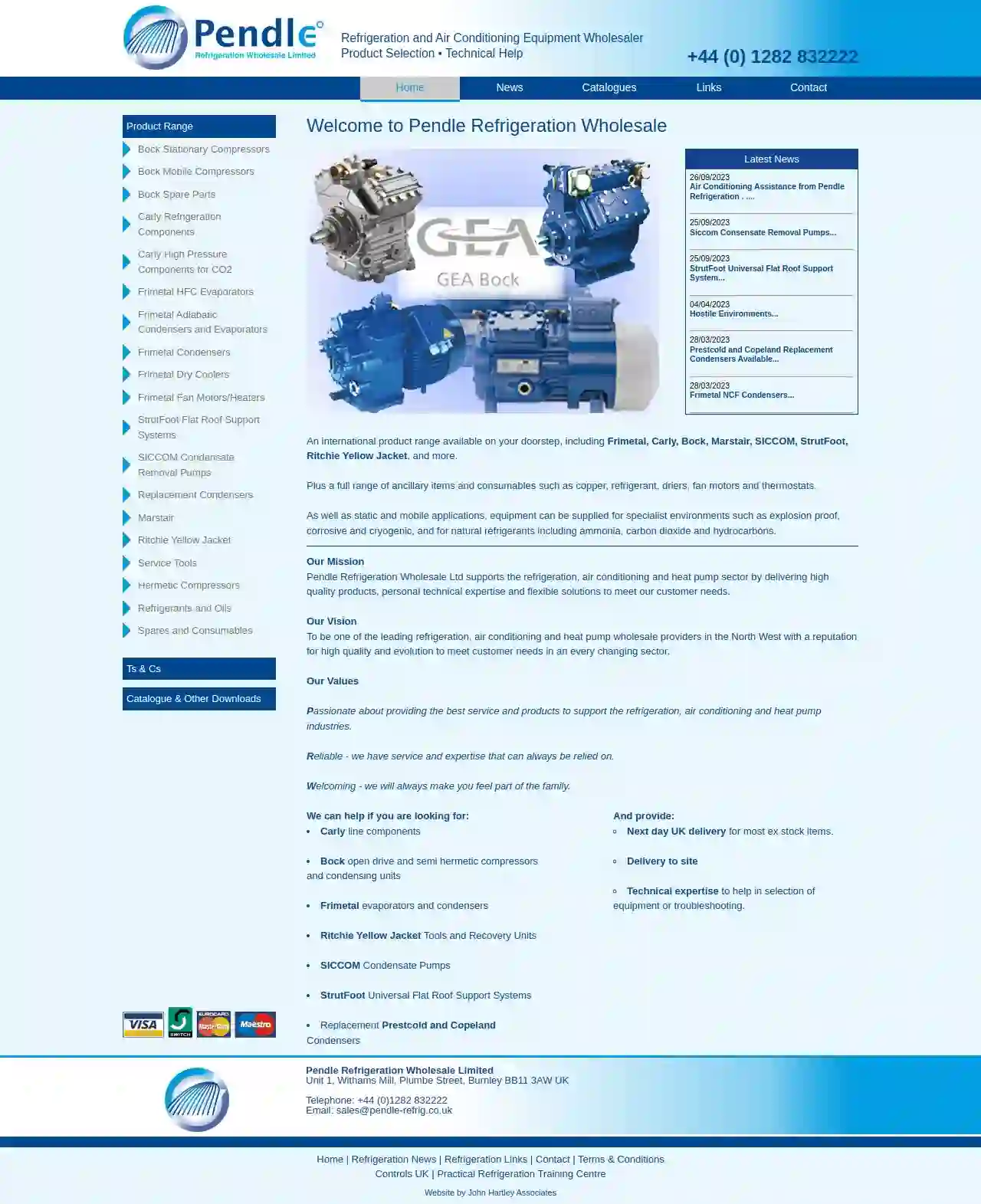
Pendle Refrigeration Wholesales Ltd
Unit 1, Withams Mill, Plumbe Street, Burnley, BB11 3AW, GBPendle Refrigeration Wholesale Ltd supports the refrigeration, air conditioning and heat pump sector by delivering high quality products, personal technical expertise and flexible solutions to meet our customer needs. We offer an international product range available on your doorstep, including Frimetal, Carly, Bock, Marstair, SICCOM, StrutFoot, Ritchie Yellow Jacket, and more. Plus a full range of ancillary items and consumables such as copper, refrigerant, driers, fan motors and thermostats. Our equipment can be supplied for static and mobile applications, as well as specialist environments such as explosion proof, corrosive and cryogenic, and for natural refrigerants including ammonia, carbon dioxide and hydrocarbons. We can help if you are looking for: Carly line components, Bock open drive and semi hermetic compressors and condensing units, Frimetal evaporators and condensers, Ritchie Yellow Jacket Tools and Recovery Units, SICCOM Condensate Pumps, StrutFoot Universal Flat Roof Support Systems, Replacement Prestcold and Copeland Condensers. We provide next day UK delivery for most ex stock items, delivery to site and technical expertise to help in selection of equipment or troubleshooting.
- Services
- Why Us?
- Gallery
Get Quote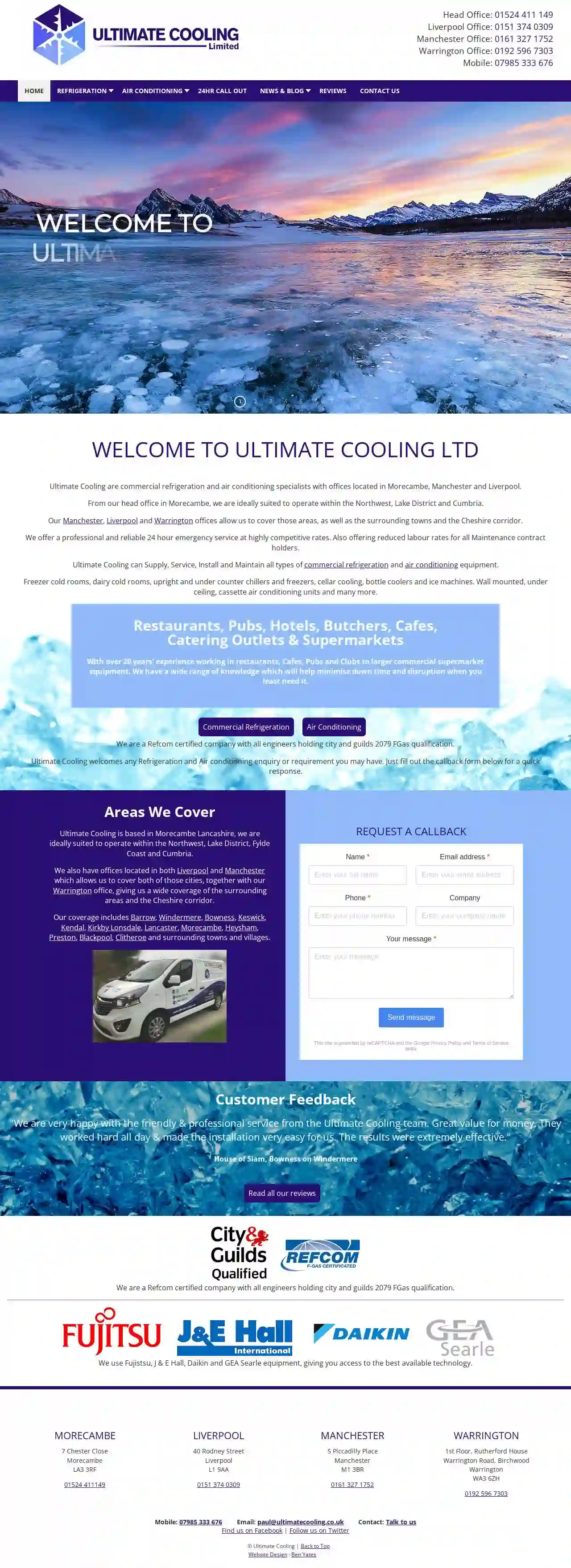
Ultimate Cooling Ltd
53 reviews7 Chester Close, Heaton With Oxcliffe, Morecambe, LA3 3RF, GBUltimate Cooling Ltd is a commercial refrigeration and air conditioning specialist with offices in Morecambe, Manchester, and Liverpool. From their head office in Morecambe, they serve the Northwest, Lake District, and Cumbria. Their Manchester, Liverpool, and Warrington offices allow them to cover those areas and the surrounding towns and the Cheshire corridor. They offer a 24-hour emergency service at competitive rates and reduced labour rates for maintenance contract holders. Ultimate Cooling can supply, service, install, and maintain all types of commercial refrigeration and air conditioning equipment, including freezer cold rooms, dairy cold rooms, upright and under counter chillers and freezers, cellar cooling, bottle coolers, and ice machines. They also work with wall mounted, under ceiling, and cassette air conditioning units. With over 20 years of experience working in restaurants, cafes, pubs, clubs, and larger commercial supermarket equipment, they have a wide range of knowledge to minimize downtime and disruption. Ultimate Cooling is a Refcom certified company with all engineers holding city and guilds 2079 FGas qualification. They use Fujitsu, J & E Hall, Daikin, and GEA Searle equipment, giving you access to the best available technology.
- Services
- Why Us?
- Accreditations
- Our Team
- Testimonials
- Gallery
Get Quote
Upson Plumbing & Heating
Leyland, GBWe are proud to support our local community and here to help you become more efficient at home. Upson Plumbing & Heating has built a credible reputation locally, for offering high quality services at competitive pricing. We offer a range of heating services that include: New boiler installation, Boiler servicing & repairs, Boiler breakdowns, Radiator repairs & installation. We also offer a range of plumbing services that include: New bathroom installation, Repairs to damaged or burst pipes, Installing heated towel rails, Fitting new radiators, Overflow repairs, Leak repairs, Toilet installation, Shower fitting, Fitting new taps and sinks, Repairs to taps and sinks, Any other general plumbing.
- Services
- Why Us?
- Accreditations
- Our Team
- Testimonials
- Gallery
Get Quote
Jay Law Limited Plumbing Heating Air Conditioning
527 reviewsStation Lane, Scorton, Wyrebank, Preston, PR3 1AN, GBTrust your local family run Plumbing, Heating & Air Conditioning Specialists. Get in touch with us today to discuss your requirements. Instant Boiler Quote. Get up to 12 Years Parts & Labour Guarantee when we install your new boiler.* As Worcester Bosch Accredited Installers, we can offer extended guarantees on selected Worcester Bosch boilers and flexible finance options available. Instant Boiler Quote. Too hot? Too cold? Take Control of your climate with the luxury of Air Conditioning now available for less Air conditioning is now more affordable and more popular in domestic homes than ever before. Call us today Spread the Cost, Finance Available. Get a New Boiler Today Instant Boiler Quote. No Heating? No Hot water?No Problem we are here to help New Boiler? Get MORE with Jay Law! We are Plumbing, Heating and Air Conditioning engineers installing and maintaining Heating & Air Conditioning systems throughout the North West. With a fast response, competitive pricing and a wealth of industry knowledge WE are here to help. "Boiler on the blink" We hear you! Problems with the Plumbing? We've got you! With no call out charge and free Quotations its quick and easy to book your visit today. Need a Boiler quote now? Hit that instant quote button and lets get the ball rolling! With over 20 years of experience, we have the knowledge and expertise needed to ensure that you receive nothing but the best service. Our reputation has been developed through hard work and reliability which is why we are the area's number one choice for plumbing, heating and air conditioning. Boiler Installations We specialise in the installation of modern condensing boilers from Worcester Bosch. Servicing & Repairs Problems with your heating or need to book an annual boiler service? Get in touch today. Finance Options Spread the cost of your new Worcester Bosch boiler with flexible monthly payments. Air conditioning Air conditioning is now more affordable and more popular in domestic homes than ever before. Our Story In 2001, Hayley and I felt that together we had the relevant Skills and Creativity to open a Plumbing & Heating business in Blackpool. That's where our adventure began…… In the early days things were hectic but with dedication, determination and a lot of organisation things quickly fell into place, we worked long and hard to establish a good reputation and it soon paid off. Worcester Bosch approached us in 2005, offering an opportunity to become an Accredited Installer, as Heating Engineers we approved of their products so jumped on board with the Worcester Bosch brand and have never looked back since. During 2006 our reputation had successfully grown in the private sector, this led us to embark on a new project working alongside Blackpool Council, installing New Boilers, Central Heating Systems, General Plumbing and Level Access Wet Rooms. This was a huge success as it continued for more than 13 years until funding was no longer attainable via central government. In 2010, we decided to register the business as an official company and became Jay Law Limited, we felt the business had grown and was continuing to strengthen, we saw it as an opportunity to step up to the next level and develop our brand. Throughout the last 10 years Jay Law Limited has thrived in the Domestic Plumbing & Heating market. An example of this was to be one of the first in the uk to become an Accredited Installer of the newly manufactured Air Conditioning range at Worcester Bosch. As a Company we have expanded our reach, now serving the whole North West, we have also partnered with Hitachi Finance to introduce Flexible Payment options on all New Worcester Bosch Boilers and Air Conditioning units. We have advanced with technology, using superior field software and have continued to build a confident and experienced workforce. All this has secured us a wealth of satisfied customers and a reputation that is second to none.
- Services
- Why Us?
- Accreditations
- Our Team
- Gallery
Get Quote
WS Gas Solutions | Leyland | Gas Engineer
52 reviewsPreston, Lancashire, 1 Heys Hunt Ave, PR25 3UG, GBWS Gas Solutions Ltd is a thriving, local business with decades of combined experience. Our gas safe registered engineers carry out all domestic and commercial gas works throughout Preston and the surrounding areas to the very highest of industry standards. From routine boiler servicing and power flushing to boiler installations and upgrades, we always have the right engineer for the job. We are confident that you will be delighted with our workmanship, whether it’s a new boiler installation or a gas cooker repair. You will have total peace of mind from us as we never ask for a deposit, we always quote before commencing works and we will provide you with the correct advice from start to finish. We take immense pride in our work that stems from our diligence and excellence. No situation poses a problem for our gas safe registered engineers, and you can be certain that they will provide a satisfying customer experience by way of their meticulous and professional approach to each and every job.
- Services
- Why Us?
- Accreditations
- Our Team
- Gallery
Get Quote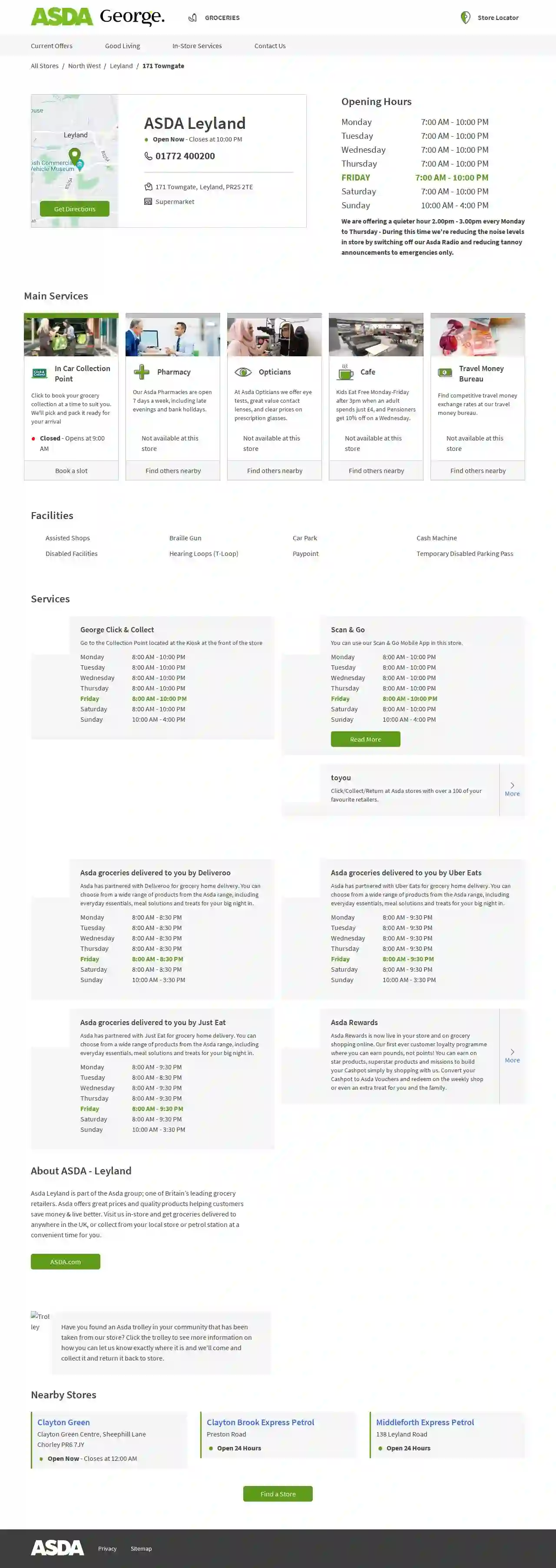
Asda Leyland Supermarket
3.7108 reviews171 Towngate, Leyland, PR25 2TE, GBASDA Leyland is a supermarket located in Leyland, North West. The store offers a range of services including George Click & Collect, Scan & Go, and pharmacy services. The store is open from 7:00 AM to 10:00 PM Monday to Saturday and 10:00 AM to 4:00 PM on Sunday. The store also offers a quieter hour from 2:00 PM to 3:00 PM every Monday to Thursday, during which time the noise levels are reduced to minimize disruption to customers.
- Services
- Why Us?
- Gallery
Get Quote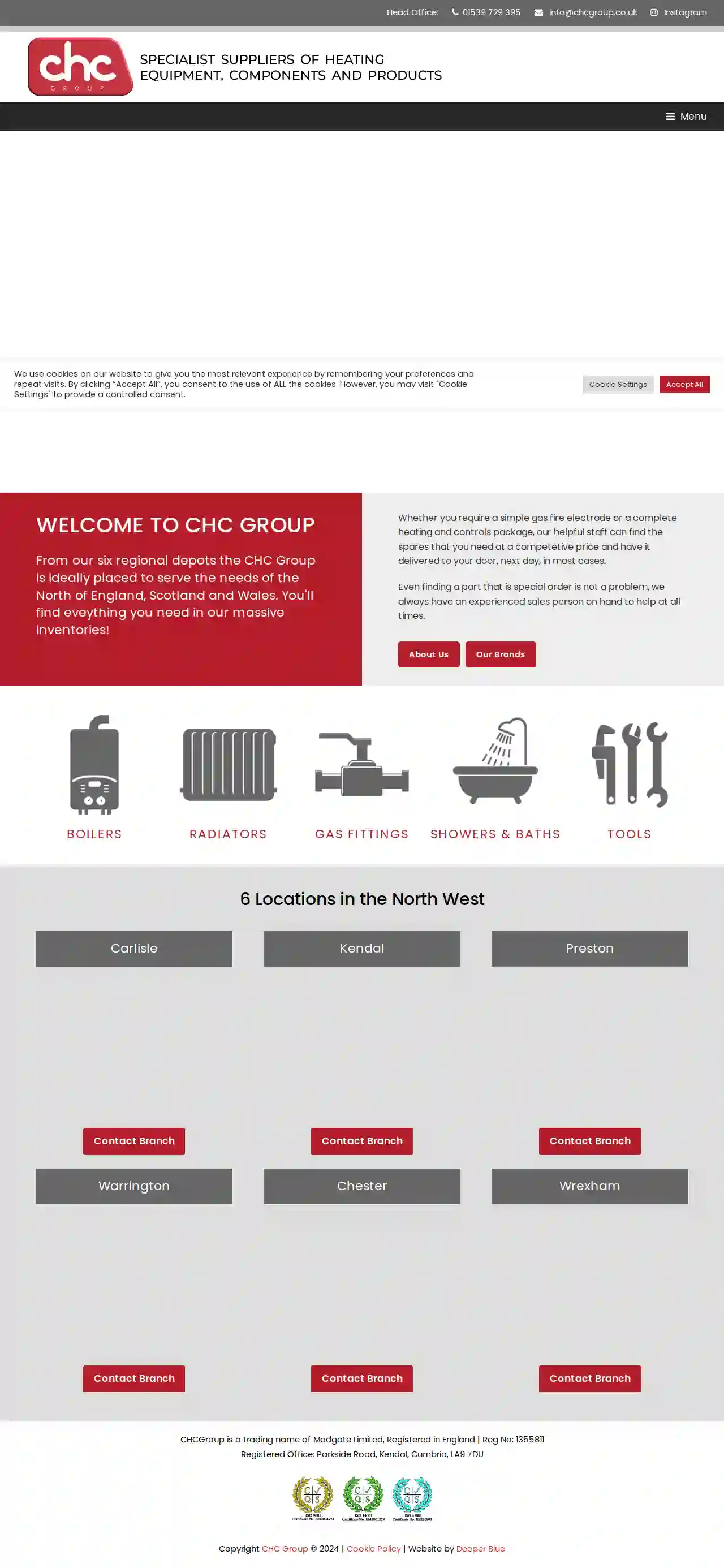
Cumbria Heating Component
4.617 reviewsChorley, GBWelcome to CHC Group. From our six regional depots, the CHC Group is ideally placed to serve the needs of the North of England, Scotland and Wales. You'll find everything you need in our massive inventories! Whether you require a simple gas fire electrode or a complete heating and controls package, our helpful staff can find the spares that you need at a competitive price and have it delivered to your door, next day, in most cases. Even finding a part that is special order is not a problem, we always have an experienced sales person on hand to help at all times.
- Services
- Why Us?
- Gallery
Get Quote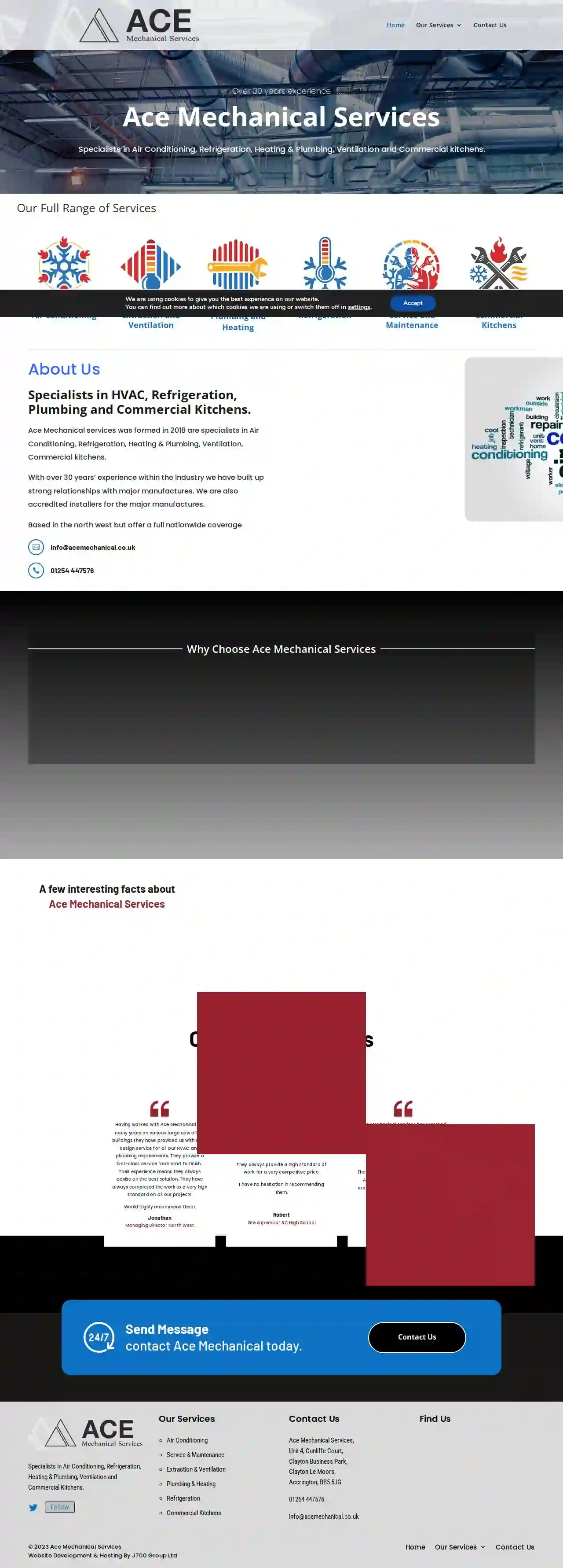
Ace Mechanical Services
51 reviewsUnit 4, Cunliffe Court, Clayton Business Park, Clayton Le Moors, Accrington, BB5 5JG, GBOver 30 years experience, Ace Mechanical Services, Specialists in Air Conditioning, Refrigeration, Heating & Plumbing, Ventilation and Commercial kitchens. Our Full Range of Services, Air Conditioning, Extraction and Ventilation, Plumbing and Heating, Refrigeration, Service and Maintenance, Commercial Kitchens. With over 30 years’ experience within the industry we have built up strong relationships with major manufactures. We are also accredited installers for the major manufactures. Based in the north west but offer a full nationwide coverage.
- Services
- Why Us?
- Accreditations
- Testimonials
- Gallery
Get Quote
Gas Tech Plumbers Ltd
4.8125 reviewsCasterton Avenue, Burnley, BB10 2PB, GBGas Tech have been serving households, landlords and businesses for the past 12 years. Our workforce of highly trained gas engineers are here to support your installation, repair and maintenance requirements for plumbing, gas services and central heating. We aim to build on the trust built over the years from our loyal base of customers in Burnley, Blackburn, Darwen, Rawntenstall, Padiham, Accrington, Clitheroe, Nelson, Colne, Barrowford, Skipton & Barnoldswick. Get in touch to see how we can help.
- Services
- Why Us?
- Testimonials
- Gallery
Get Quote
Over 12,692+ HVAC Companies on our platform
Our HVAC pros operate in Hesketh Bank & beyond!
HVACCompaniesHub has curated and vetted the Best HVAC Businesses in and around Hesketh Bank. Find a top & trustworthy pro today.
Frequently Asked Questions About HVAC Companies
- Regular Air Filter Replacement: Change or clean your HVAC system’s air filters regularly (every 1-3 months).
- Professional Air Duct Cleaning: Have your air ducts cleaned by professionals every few years to eliminate dust, mold, and other contaminants.
- Improve Ventilation: Ensure adequate ventilation in your home to bring in fresh air and exhaust stale air. Use exhaust fans in kitchens and bathrooms.
- Control Humidity Levels: Use a humidifier or dehumidifier to maintain optimal humidity levels and prevent mold growth.
- Clean Regularly: Dust and vacuum frequently to minimize airborne particles.
- Avoid Smoking Indoors: Smoking indoors significantly reduces IAQ.
- Use Natural Cleaning Products: Opt for natural cleaning products that don’t release harmful VOCs (volatile organic compounds).
- Monitor Indoor Air Quality: Consider using an indoor air quality monitor to track pollutant levels.
What is the difference between an AC unit and a heat pump?
How can I improve my home's indoor air quality?
How long does an HVAC system last?
What is a SEER rating, and why is it important?
What is the difference between an AC unit and a heat pump?
How can I improve my home's indoor air quality?
- Regular Air Filter Replacement: Change or clean your HVAC system’s air filters regularly (every 1-3 months).
- Professional Air Duct Cleaning: Have your air ducts cleaned by professionals every few years to eliminate dust, mold, and other contaminants.
- Improve Ventilation: Ensure adequate ventilation in your home to bring in fresh air and exhaust stale air. Use exhaust fans in kitchens and bathrooms.
- Control Humidity Levels: Use a humidifier or dehumidifier to maintain optimal humidity levels and prevent mold growth.
- Clean Regularly: Dust and vacuum frequently to minimize airborne particles.
- Avoid Smoking Indoors: Smoking indoors significantly reduces IAQ.
- Use Natural Cleaning Products: Opt for natural cleaning products that don’t release harmful VOCs (volatile organic compounds).
- Monitor Indoor Air Quality: Consider using an indoor air quality monitor to track pollutant levels.